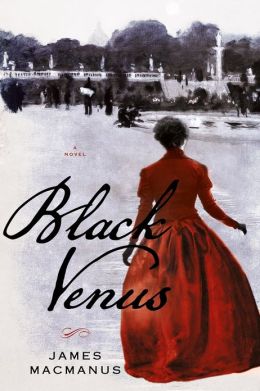Review: Black Venus
Title: Black Venus
Author: James MacManus
Publisher: Thomas Dunne Books
Pub Date: May 7, 2013
How Acquired: From the publicist
What it’s About: A
vivid novel of Charles Baudelaire and his lover Jeanne Duval, the Haitian
cabaret singer who inspired his most famous and controversial poems, set in
nineteenth-century Paris.
For readers who have been drawn to The Paris Wife, Black
Venus captures the artistic scene in the great French city decades earlier,
when the likes of Dumas and Balzac argued literature in the cafes of the Left
Bank. Among the bohemians, the young Charles Baudelaire stood out—dressed
impeccably thanks to an inheritance that was quickly vanishing. Still at work
on the poems that he hoped would make his name, he spent his nights enjoying
the alcohol, opium, and women who filled the seedy streets of the city.
One woman would catch
his eye—a beautiful Haitian cabaret singer named Jeanne Duval. Their lives
would remain forever intertwined thereafter, and their romance would inspire
his most infamous poems—leading to the banning of his masterwork, Les Fleurs du Mal, and a scandalous
public trial for obscenity.
My thoughts: I knew
very little about Charles Baudelaire before reading this book. I had read some of his poetry in one of my
French classes in college, and I had heard something about Jeanne Duval, but
that was all that I knew. So when I
heard that a new novel was coming out about Baudelaire and his mistress Jeanne
Duval, I was eager to read it. First of
all, the cover is beautifully rendered; I would have picked up the book just
for the cover alone. There were so many
things that I enjoyed about this book, the intimate view of bohemian Paris,
that some might be familiar with from the opera La Bohème. The book starts in 1842, when Baudelaire is about
to turn 21; he’s a dandy who spends his allowance on expensive clothes, fine
wines and food, and his nights hanging out with his bohemian friends in the
cafes and restaurants of Paris. But Baudelaire is different from his friends,
he’s aware of the hypocrisy of their lives.
They are not true bohemians; they have warm homes and families that they
can retreat to after a night out on the town. His mother worries about his extravagant
lifestyle, that he is determined to ruin himself. Baudelaire believes that he will be the
greatest poet that France has ever seen, although he rejects the Romanticism
that has prevailed in literature since the end of the 18th century. He wants to write about the reality of life,
pain, death, and sex. Unfortunately for
Baudelaire, what sells are poems about nature, flowers and love.
One night on the town, he stumbles into a cabaret where
Jeanne Duval is singing. She’s a mulatto
from Haiti, who fled her homeland, hoping that Paris would offer her a better
life. In a way, both Baudelaire and
Duval are both outcasts which draw them together. That and their mutual desire for opium. MacManus does an amazing job of recreating
this world for the reader, not just delving into Baudelaire and Jeanne’s worlds
but also the outside world. Paris during
this period is changing, from the monarchy of Louis Philippe to the reign of
Napoleon III, from a Paris that has changed little from the middle ages to the
modern city of wide boulevards that Baron Haussmann created. What I found difficult was trying to understand not what drew Baudelaire and Jeanne together but kept them together for 16 years. As MacManus describes the relationship, Jeanne was not in love with Baudelaire or he with her. Was it lust? Or their mutual love of opium that kept them together. Jeanne not only slept with his friends, but she was openly disdainful of his work, believing that he would never be a success as a poet. Once she realizes that Baudelaire no longer has the money to keep her in the lifestyle to which she would like to become accustomed, why does she stay with him? MacManus can’t answer that question. In fact, he writes that neither Jeanne nor Baudelaire knew what kept them together. They seem to be two people who can neither live with each other or without each other. That kind of co-dependency can be unpleasant after a while.
Truthfully, I found both Baudelaire and Jeanne not very sympathetic or likeable people. Although the book is incredibly well-written, it wasn’t easy to spend time reading about people you just want to smack. I found Baudelaire to be selfish, childish, jealous and petulant. Jeanne is made of tougher stuff. She’s smart enough to know that because of her color, she would never be able to launch herself as a courtesan the way Marie Duplessis was able to.
While Black Venus didn’t fulfill all of my expectations, I did find it a compelling read of an era that one doesn’t often find in historical fiction.




Comments
Urgent Care in Rockville md